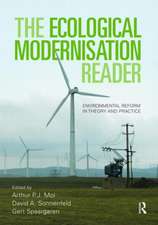Development Through Bricolage: Rethinking Institutions for Natural Resource Management: Earthscan Studies in Natural Resource Management
Autor Frances Cleaveren Limba Engleză Paperback – 21 iun 2012
The author explores the processes involved in institutional bricolage; the constant renegotiation of norms, the reinvention of tradition, the importance of legitimate authority and the role of people themselves in shaping such arrangements. Bricolage is seen as an inevitable, but not always benign process; the extent to which it reproduces social inequalities or creates space for challenging them is also considered. The book draws on a number of contemporary strands of development thinking about collective action, participation, governance, natural resource management, political ecology and wellbeing. It synthesises these to develop new understandings of why and how people act to manage resources and how access is secured or denied. A variety of case studies ranging from the management of water (Zimbabwe, India, Pakistan), conflict and cooperation over land, grazing and water (Tanzania), and the emergence of community management of forests (Sweden, Nepal), illustrate the context specific and generalised nature of bricolage and the resultant challenges for development policy and practice.
| Toate formatele și edițiile | Preț | Express |
|---|---|---|
| Paperback (1) | 415.67 lei 43-57 zile | |
| Taylor & Francis – 21 iun 2012 | 415.67 lei 43-57 zile | |
| Hardback (1) | 999.34 lei 43-57 zile | |
| Taylor & Francis – 21 iun 2012 | 999.34 lei 43-57 zile |
Din seria Earthscan Studies in Natural Resource Management
-
 Preț: 312.94 lei
Preț: 312.94 lei -
 Preț: 318.95 lei
Preț: 318.95 lei -
 Preț: 300.01 lei
Preț: 300.01 lei -
 Preț: 295.20 lei
Preț: 295.20 lei -
 Preț: 310.51 lei
Preț: 310.51 lei - 9%
 Preț: 868.85 lei
Preț: 868.85 lei - 18%
 Preț: 1000.27 lei
Preț: 1000.27 lei -
 Preț: 442.50 lei
Preț: 442.50 lei -
 Preț: 388.85 lei
Preț: 388.85 lei -
 Preț: 463.02 lei
Preț: 463.02 lei -
 Preț: 266.20 lei
Preț: 266.20 lei -
 Preț: 325.79 lei
Preț: 325.79 lei -
 Preț: 416.22 lei
Preț: 416.22 lei - 19%
 Preț: 271.58 lei
Preț: 271.58 lei -
 Preț: 456.50 lei
Preț: 456.50 lei -
 Preț: 445.56 lei
Preț: 445.56 lei - 31%
 Preț: 764.22 lei
Preț: 764.22 lei - 12%
 Preț: 325.34 lei
Preț: 325.34 lei -
 Preț: 389.11 lei
Preț: 389.11 lei - 18%
 Preț: 1001.07 lei
Preț: 1001.07 lei - 18%
 Preț: 1000.27 lei
Preț: 1000.27 lei - 18%
 Preț: 189.09 lei
Preț: 189.09 lei -
 Preț: 416.22 lei
Preț: 416.22 lei - 18%
 Preț: 1117.88 lei
Preț: 1117.88 lei - 30%
 Preț: 768.62 lei
Preț: 768.62 lei - 31%
 Preț: 764.20 lei
Preț: 764.20 lei - 18%
 Preț: 1000.27 lei
Preț: 1000.27 lei - 49%
 Preț: 544.75 lei
Preț: 544.75 lei - 18%
 Preț: 999.82 lei
Preț: 999.82 lei -
 Preț: 386.81 lei
Preț: 386.81 lei - 18%
 Preț: 1009.55 lei
Preț: 1009.55 lei - 18%
 Preț: 1013.52 lei
Preț: 1013.52 lei - 18%
 Preț: 1009.55 lei
Preț: 1009.55 lei
Preț: 415.67 lei
Nou
Puncte Express: 624
Preț estimativ în valută:
79.55€ • 82.74$ • 65.67£
79.55€ • 82.74$ • 65.67£
Carte tipărită la comandă
Livrare economică 14-28 aprilie
Preluare comenzi: 021 569.72.76
Specificații
ISBN-13: 9781844078691
ISBN-10: 1844078698
Pagini: 240
Ilustrații: 10 black & white illustrations, 3 black & white tables, 7 black & white line drawings
Dimensiuni: 138 x 216 x 15 mm
Greutate: 0.44 kg
Ediția:New.
Editura: Taylor & Francis
Colecția Routledge
Seria Earthscan Studies in Natural Resource Management
Locul publicării:Oxford, United Kingdom
ISBN-10: 1844078698
Pagini: 240
Ilustrații: 10 black & white illustrations, 3 black & white tables, 7 black & white line drawings
Dimensiuni: 138 x 216 x 15 mm
Greutate: 0.44 kg
Ediția:New.
Editura: Taylor & Francis
Colecția Routledge
Seria Earthscan Studies in Natural Resource Management
Locul publicării:Oxford, United Kingdom
Public țintă
Postgraduate and ProfessionalCuprins
Acknowledgements. Preface 1. Getting Institutions Right: Interrogating Theory and Policy 2. Introducing Bricolage 3. The Way we have Always Done it 4. Plural Institutions; New Arrangements, Old Inequalities? 5. Continuity and Change: Gendered Agency and Bricolage 6. Piecing Together Policy Knowledge: Promises and Pitfalls 7. Remapping the Institutional Landscape 8. Transforming Institutions? Index
Recenzii
"The idea of 'bricolage' is an attractive one, and neatly captures the idea that institutions can only very partially be shaped and planned by outside interventions... the book not only provides an original and much needed addition to the literature on institutions, but also gives a wonderful overview of the existing literature - turning it into an excellent work of reference for scholars and students." – Margreet Zwarteveen, Assistant Professor and Senior Researcher at Wageningen University, the Netherlands
"The main contribution of Development Through Bricolage comes from its explication of the prevalence of ‘bricolage’, grounded in examples from Tanzania, Zimbabwe, and Sweden. For students, practitioners, and academics wanting alternatives to simplistic, and unrealistic, models, the concept of ‘bricolage’ opens the door to a wider way of thinking about natural resources management and international development." – Bryan Bruns, Consulting Sociologist and Independent Scholar and co-editor of Negotiating Water Rights (Intermediate Technology Publications, London, 2000)
"I recommend this book highly to everyone trying to understand the reality of attempting to encourage institutional change or to introduce new types of water management institutions. The disappointing experience with introducing water users associations over the past few decades is a case in point. But reading this book takes time and patience: because it avoids sweeping easy general conclusions, and instead offers a subtle and nuanced argument, non-social scientists in particular may find it a slow read – but your patience will be rewarded by the insightfulness of each chapter." – Douglas J. Merrey, Water Alternatives
"Cleaver succeeds ... in giving voice to the many examples that illustrate bricolage, and more importantly in beginning to flesh out how institutional bricolage relates to previous social theorizing, and then providing a framework for those working on the critical boundaries of development studies" – Ken J. Caine, Society and Natural Resources
"This is an interesting book not only for advanced social scientists, undergratduate students and scholars, but also for any professionals concerned with the environmental use of resources (such as civil engineers, land planners or professional ecologists)." - Oscar Alfranca (in Progress in Development Studies, 2017)
"The main contribution of Development Through Bricolage comes from its explication of the prevalence of ‘bricolage’, grounded in examples from Tanzania, Zimbabwe, and Sweden. For students, practitioners, and academics wanting alternatives to simplistic, and unrealistic, models, the concept of ‘bricolage’ opens the door to a wider way of thinking about natural resources management and international development." – Bryan Bruns, Consulting Sociologist and Independent Scholar and co-editor of Negotiating Water Rights (Intermediate Technology Publications, London, 2000)
"I recommend this book highly to everyone trying to understand the reality of attempting to encourage institutional change or to introduce new types of water management institutions. The disappointing experience with introducing water users associations over the past few decades is a case in point. But reading this book takes time and patience: because it avoids sweeping easy general conclusions, and instead offers a subtle and nuanced argument, non-social scientists in particular may find it a slow read – but your patience will be rewarded by the insightfulness of each chapter." – Douglas J. Merrey, Water Alternatives
"Cleaver succeeds ... in giving voice to the many examples that illustrate bricolage, and more importantly in beginning to flesh out how institutional bricolage relates to previous social theorizing, and then providing a framework for those working on the critical boundaries of development studies" – Ken J. Caine, Society and Natural Resources
"This is an interesting book not only for advanced social scientists, undergratduate students and scholars, but also for any professionals concerned with the environmental use of resources (such as civil engineers, land planners or professional ecologists)." - Oscar Alfranca (in Progress in Development Studies, 2017)
Descriere
This book disputes the model of development by design and argues that institutions are formed through institutional bricolage, the uneven patching together of old practices and accepted norms with new arrangements. The book draws on a number of contemporary strands of development thinking, and synthesises these to develop new understandings of why and how people act to manage resources and how access is secured or denied.









